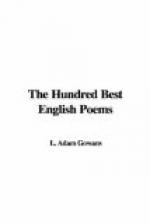Their name, their years, spelt by th’ unletter’d
Muse,
The place of fame and elegy supply:
And many a holy text around she strews,
That teach the rustic moralist to die.
For who, to dumb forgetfulness a prey,
This pleasing anxious being e’er
resign’d,
Left the warm precincts of the cheerful day,
Nor cast one longing ling’ring look
behind?
On some fond breast the parting soul relies,
Some pious drops the closing eye requires;
E’en from the tomb the voice of nature cries,
E’en in our ashes live their wonted
fires.
For thee, who, mindful of th’ unhonour’d
dead,
Dost in these lines their artless tale
relate;
If chance, by lonely contemplation led,
Some kindred spirit shall enquire thy
fate,—
Haply some hoary-headed swain may say,
’Oft have we seen him at the peep
of dawn
Brushing with hasty steps the dews away,
To meet the sun upon the upland lawn:
’There at the foot of yonder nodding beech,
That wreathes its old fantastic roots
so high,
His listless length at noontide would he stretch,
And pore upon the brook that babbles by.
’Hard by yon wood, now smiling as in scorn,
Mutt’ring his wayward fancies he
would rove;
Now drooping, woful-wan, like one forlorn,
Or craz’d with care, or cross’d
in hopeless love.
’One morn I miss’d him on the custom’d
hill,
Along the heath, and near his fav’rite
tree;
Another came; nor yet beside the rill,
Nor up the lawn, nor at the wood was he:
’The next, with dirges due in sad array
Slow through the church-way path we saw
him borne:—
Approach and read (for thou canst read) the lay
Grav’d on the stone beneath yon
aged thorn.’
THE EPITAPH.
Here rests his head upon the lap of earth
A youth, to fortune and to fame unknown:
Fair science frown’d not on his humble birth,
And melancholy mark’d him for her
own.
Large was his bounty, and his soul sincere,
Heaven did a recompense as largely send:
He gave to mis’ry (all he had) a tear,
He gain’d from heav’n (’twas
all he wish’d) a friend.
No farther seek his merits to disclose,
Or draw his frailties from their dread
abode,
(There they alike in trembling hope repose,)
The bosom of his Father and his God.
Mitford’s Text.
* * * * *
WILLIAM ERNEST HENLEY.
30. To R. T. H. B.
Out of the night that covers me,
Black as the Pit from pole to pole,
I thank whatever gods may be
For my unconquerable soul.
In the fell clutch of circumstance
I have not winced nor cried aloud.
Under the bludgeonings of chance
My head is bloody, but unbowed.
Beyond this place of wrath and tears
Looms but the Horror of the shade,
And yet the menace of the years
Finds, and shall find, me unafraid.




